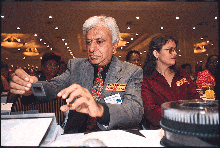Confronting Conference ComplexitiesJon Cohen*DURBAN, SOUTH AFRICA--For most of his life, Hoosen "Jerry" Coovadia was a second-class citizen. As an ethnic Indian in South Africa's apartheid system, the University of Natal pediatrician had limited freedom to conduct his own research and little contact with colleagues abroad. "Access to the outside world and the research agenda was dictated by the white minority," he says matter-of-factly. But, like that of millions of black, Indian, and "colored" citizens of South Africa, Coovadia's world changed in 1994 when South Africa held its first democratic election. Next month, Coovadia's status in the new South Africa will be unmistakable: He will chair the XIII International AIDS Conference here, the first time this high-profile gathering has been held in a developing country. "We see this conference not only as an opportunity for scientific discourse, but as a chance to highlight South Africa--the extent of the epidemic here and what we've been able to do in this country," says Salim Abdool Karim, who chairs the conference's scientific committee. Karim, who also is of Indian descent, notes that he and other scientists for many years supported an academic boycott imposed by international colleagues to pressure the South African government to end apartheid. "Even though it was a necessary strategy, it hurt us and the enemy," says Karim. "Research in South Africa is still suffering from that. It's just a necessary part of the price we paid for our freedom." Coovadia, Karim, and the other organizers have gone to great lengths to make the conference work smoothly. They've had several meetings with representatives of pharmaceutical companies, who in years past have set up luxurious, even garish, booths to promote their latest anti-HIV drugs--which most Africans of course cannot afford. "If they keep their word, they will have much more restrained displays," says Coovadia.  Picture perfect? Jerry Coovadia has worked overtime to prevent problems from disrupting the meeting. The organizers also have tried to allay, as best they can, the concerns that many foreign scientists have about visiting South Africa. Some have called for a boycott to protest South African President Thabo Mbeki's handling of the country's AIDS epidemic; others worry for their safety. Although most international AIDS conferences have issued upbeat press releases in the weeks preceding the meeting, the South Africans have put out notices arguing against a boycott and describing the various security firms they (and some pharmaceutical companies) have hired. Another press release states that a protest march against "pharmaceutical giants" will precede the opening ceremony and "will be peaceful, not 'another Seattle,' " a reference to last year's riots that disrupted the World Trade Organization meeting in Seattle, Washington. Coovadia says he welcomes protests as long as they don't cause harm or damage. "We ourselves grew up in an environment where we protested apartheid," he says. Although he suspects attendance may be lower than the last few meetings--both Geneva in 1998 and Vancouver in 1996 had about 10,000 attendees--he says he expects at least 8000. Karim stresses that South Africa offers something never seen before at an international AIDS conference: an upclose look at the AIDS epidemic, ground zero. "It's very nice to go to Vancouver. It's very nice to go to Geneva," says Karim. "But we want the world to see what the epidemic can do to destroy a country and a continent."
* Jon Cohen was accompanied by photographer Malcolm Linton. For a gallery of additional photos and the stories behind them, see www.sciencemag.org/feature/data/aids_africa/gallery.shl.
|